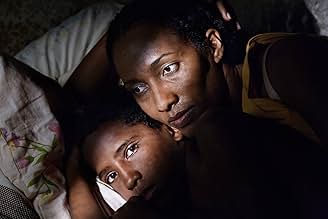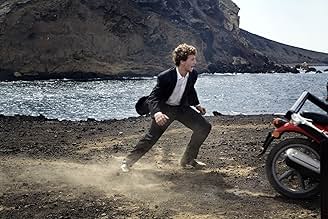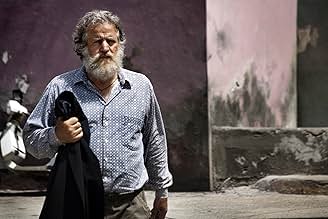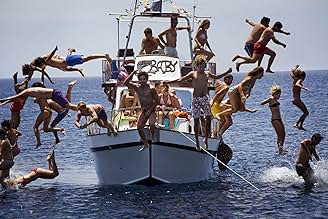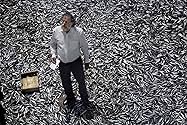NOTE IMDb
6,7/10
3,3 k
MA NOTE
Ajouter une intrigue dans votre langueA Sicilian family deals with the arrival of a group of immigrants on their island.A Sicilian family deals with the arrival of a group of immigrants on their island.A Sicilian family deals with the arrival of a group of immigrants on their island.
- Réalisation
- Scénario
- Casting principal
- Récompenses
- 20 victoires et 23 nominations au total
Dario Veca
- Pasquale
- (as Tindaro Veca)
Avis à la une
A remarkable film from a group of busy Italian film makers whose output is largely unknown in the English speaking world, though the director's RESPIRO did get some sub-titled screening. This one deserves the Oscar it's been put up for.
Hardships among Sicilian fishermen (oh oh) who become involved with I clandestini - illegal immigrants (Oh Oh!) but this one has a sharper edge than the do gooder-films that usually make their way into art theatres. The night time white water advancing on the small boat has genuine menace and the again admirable Finocchiaro turning on the black woman they saved, when pregnant and abandoned by her fellow escapees, is all the more effective because it's unfamiliar. The film is not without compassion but underlays it with a new realism.
Cast, crisp camera-work, sunny scenes of ocean front life, the spectacle of half clothed tourist merry makers, whose relation with the locals is as dodgy as that of the Africans, all add to the impact of an involving and accomplished production.
Hardships among Sicilian fishermen (oh oh) who become involved with I clandestini - illegal immigrants (Oh Oh!) but this one has a sharper edge than the do gooder-films that usually make their way into art theatres. The night time white water advancing on the small boat has genuine menace and the again admirable Finocchiaro turning on the black woman they saved, when pregnant and abandoned by her fellow escapees, is all the more effective because it's unfamiliar. The film is not without compassion but underlays it with a new realism.
Cast, crisp camera-work, sunny scenes of ocean front life, the spectacle of half clothed tourist merry makers, whose relation with the locals is as dodgy as that of the Africans, all add to the impact of an involving and accomplished production.
A KVIFF screening of TERRAFERMA, last year Oscar's Best Foreign Language Film entry from Italy. The Mediterranean island scenery no wonder captures a feel good cheerfulness since the very first shots of blue sea, a consistent locale as in director Emanuele Crialese's previous island-focused films GOLDEN DOOR 2006 and RESPIRO 2002, but the film has challenged on a more contentious topic, the illegal immigrants coming from the African land, since the island in the film is the very first ground they can set foot on, and subsequently their unexpected arrival will predictably prompts the life of local islanders, with a considerable foil of mainland tourists, the film has acquired quite doable folders.
The film is a decent crowd-pleaser, and the narrative is entangled with substantial emotions from its characters (notably the interplay between Donatella Finocciaro and Timnit T.), another spreading branch is our wide-eyed protagonist's growth pain (Flippo Pucillo is well-chosen in his first leading role, whose innocent appearance and sympathetic personality are typically Italian and radiates great credibility on screen), but unfortunately, both the film and the cast barely miss my 2011 Top 10 list, the competition is tougher and tougher since my accumulated filmography).
The film sets an open ending in the wake of the thorny issue it tackles with, which is a lesser achievement since it somewhat sidesteps a trapped tragic denouement, which reminds me of Matteo Garrone's REALITY (2012, 8/10), out of the realistic mire, both films opt a lightly- surrealistic way to put on some thematic impetus, but the difference is quite evident, in REALITY, the final shot is a sublimation to accent the pathologic society, while in TERRAFERMA, it seems to me is a have-to approach to at least culminate the film in its running time, quite an evasive strategy, or maybe it just opens its way to a sequel? Which I doubt the necessity.
The film is a decent crowd-pleaser, and the narrative is entangled with substantial emotions from its characters (notably the interplay between Donatella Finocciaro and Timnit T.), another spreading branch is our wide-eyed protagonist's growth pain (Flippo Pucillo is well-chosen in his first leading role, whose innocent appearance and sympathetic personality are typically Italian and radiates great credibility on screen), but unfortunately, both the film and the cast barely miss my 2011 Top 10 list, the competition is tougher and tougher since my accumulated filmography).
The film sets an open ending in the wake of the thorny issue it tackles with, which is a lesser achievement since it somewhat sidesteps a trapped tragic denouement, which reminds me of Matteo Garrone's REALITY (2012, 8/10), out of the realistic mire, both films opt a lightly- surrealistic way to put on some thematic impetus, but the difference is quite evident, in REALITY, the final shot is a sublimation to accent the pathologic society, while in TERRAFERMA, it seems to me is a have-to approach to at least culminate the film in its running time, quite an evasive strategy, or maybe it just opens its way to a sequel? Which I doubt the necessity.
Terraferma is without doubt the best film by the Sicilian director Crialese, whose earlier works include Respiro and Nuovomondo. It is a powerful, often disturbing and strongly emotional film (which some viewers and critics, mainly from the English-speaking world, seem to have difficulty with)that deals with one of the most urgent issues facing Italy, and Western Europe, the influx of desperately poor immigrants/refugees from Africa. The film is set on the Sicilian island of Lampedusa, which in recent years has received so many of these people that their "centri di accoglienza" can barely accommodate them. The harsh Bossi-Fini law, and an agreement worked out between Berlusconi's and Khaddafi's government, resulted in many immigrants who'd made it to Italy via Libya being sent back to Libya, where many were horribly mistreated. The elderly fisherman Ernesto, who rescues at sea an African mother and her son, represents an older, humane ethos, a Christian ethic in the best sense and the code of seafarers that demands one never abandons anyone lost at sea. Strong performances all around from the professional actors, including the wonderful Donatella Finocchiaro, who has appeared in the films of the Palermo-based director Roberta Torre, and the casting of actual local fishermen (there's a marvelous scene where they plot to get back at the oppressive and heartless carabineri)imparts a vivid authenticity. Terraferma also is visually stunning; Crialese loves the Mediterranean and he imbues "the wine-dark sea" with both mystical and socio-political import, as its shores embrace various yet similar civilizations. A beautiful, engrossing film with heart, soul, humor, and a powerful humanistic vision.
Emanuele Crialese's "Terraferma" at once draws attention to refugees from Africa trying to enter Europe across the Mediterranean Sea, braving all manner of dangerous conditions. This has intensified in the past few years, as people flee violence not only in Africa, but also in the Middle East. Millions saw the photo of the Syrian man crying over his dead son on the shore. There can be no doubt that military actions led to increased terrorism, further inflaming these regions. It was especially ironic in Libya, since longtime strongman Moammar Qaddafi had been a bete noire for the US for ages, but then became a US ally in the so-called War on Terrorism (no kidding; he and Condoleezza Rice became good friends), only to see the US overthrow him in 2011.
But the other thing is the current treatment of Latin American refugees in the US. We've seen the footage of children getting torn away from their parents and put in detention cages near the border. Not much different from what Italy's authorities do in this movie.
But anyway, to not get moved by this movie is to not have a soul. The blue expanse of the Mediterranean is as much a character as any of the actors. I wholeheartedly recommend it.
But the other thing is the current treatment of Latin American refugees in the US. We've seen the footage of children getting torn away from their parents and put in detention cages near the border. Not much different from what Italy's authorities do in this movie.
But anyway, to not get moved by this movie is to not have a soul. The blue expanse of the Mediterranean is as much a character as any of the actors. I wholeheartedly recommend it.
The theme is good. Nowadays, social rules are becoming more and more rational, losing the beauty that people should have. But the script is weak, the story is fragmented, the plot is too intermittent, and the turning point is too abrupt. But the lens has a great impact on people, especially the delicate layered black beach.
Le saviez-vous
- AnecdotesItaly's official submission to the Best Foreign Language Film category of the 84th Academy Awards 2012.
- ConnexionsReferenced in At the Movies: Venice Film Festival 2011 (2011)
- Bandes originalesLe Vent Nous Portera
Written by Noir Desir
Performed by Sophie Hunger
Meilleurs choix
Connectez-vous pour évaluer et suivre la liste de favoris afin de recevoir des recommandations personnalisées
- How long is Terraferma?Alimenté par Alexa
Détails
- Date de sortie
- Pays d’origine
- Site officiel
- Langues
- Aussi connu sous le nom de
- Материк
- Lieux de tournage
- Sociétés de production
- Voir plus de crédits d'entreprise sur IMDbPro
Box-office
- Budget
- 9 150 000 € (estimé)
- Montant brut aux États-Unis et au Canada
- 19 996 $US
- Montant brut mondial
- 2 343 302 $US
- Durée
- 1h 28min(88 min)
- Couleur
- Mixage
- Rapport de forme
- 2.35 : 1
Contribuer à cette page
Suggérer une modification ou ajouter du contenu manquant



